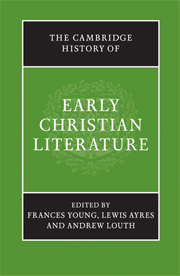Book contents
- Frontmatter
- PART ONE The Beginnings: The New Testament to Irenaeus
- PART TWO THE THIRD CENTURY
- A LITERARY GUIDE
- B CONTEXT AND INTERPRETATION
- 17 Social and historical setting: Christianity as culture critique
- 18 Articulating identity
- 19 Christian teaching
- 20 The significance of third-century Christian literature
- PART THREE FOUNDATION OF A NEW CULTURE: FROM DIOCLETIAN TO CYRIL
- Bibliographies
- Index
- Map: The Roman Empire in the late fourth century AD"
- References
20 - The significance of third-century Christian literature
from B - CONTEXT AND INTERPRETATION
Published online by Cambridge University Press: 28 March 2008
- Frontmatter
- PART ONE The Beginnings: The New Testament to Irenaeus
- PART TWO THE THIRD CENTURY
- A LITERARY GUIDE
- B CONTEXT AND INTERPRETATION
- 17 Social and historical setting: Christianity as culture critique
- 18 Articulating identity
- 19 Christian teaching
- 20 The significance of third-century Christian literature
- PART THREE FOUNDATION OF A NEW CULTURE: FROM DIOCLETIAN TO CYRIL
- Bibliographies
- Index
- Map: The Roman Empire in the late fourth century AD"
- References
Summary
From a historical point of view the significance of third-century Christian texts is incontestable. This is a fundamentally important era in the formation of Christianity. This material reveals the extent to which the Church conformed to social norms in the Greco-Roman world while remaining counter-cultural. It testifies to the pressures that increasingly focused the mind of the community on credal definitions. It provides insight into the problems of discipline and the difficulties of maintaining unity. Yet only the attempt to delve behind the principal literary deposits can reveal this, for they largely emanate from towering but problematical figures most of whom would later be judged at best on the margins of orthodoxy.
Characteristic of modern scholarship has been a suspicion of the tradition through which the deposits of the third century were transmitted. The major outcome of the historical approach has been the rehabilitation of Origen. He has rejoined the ‘Fathers’ of the Church, and his profound influence on the development of Christian theology has been fully recognized. Estimates of his achievement have oscillated from lightly Christianized philosopher to Hellenized biblical scholar. Both characterizations presuppose the same outlook, comprising the following elements: (1) the assumption that an author’s work is to be understood in terms of its historical and intellectual environment; (2) the focus on the author as one whose originality and influence is to be assessed; (3) the tendency to produce what purports to be a ‘God’s eye’ or objective view of the past, the truth about which tradition had suppressed or distorted.
Keywords
- Type
- Chapter
- Information
- The Cambridge History of Early Christian Literature , pp. 239 - 246Publisher: Cambridge University PressPrint publication year: 2004

